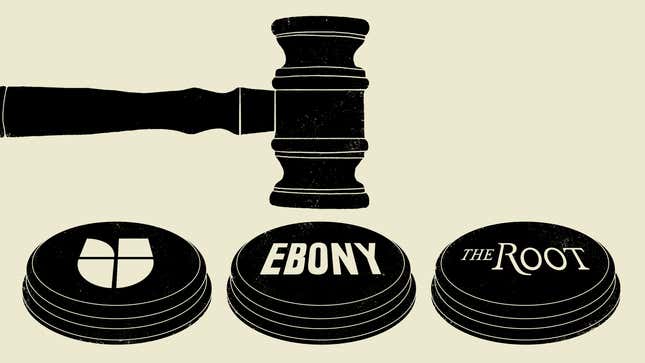
OK, so remember that whole #EbonyOwes thing? Of course, you do.
Because if you’re an avid reader of The Root, you remember us broaching this subject from the first time it became a trending topic in 2017, all the way up to our final update last November, aptly titled “Dear Ebony Magazine: FU, Pay Your Writers!”
But for those of you out of the loop, here’s the brief history of what the hell I’m talking about:
In April of 2017—almost a year after Ebony Magazine was bought out by private-equity firm Clear View Group—writer Jagger Blaec pulled back the curtain on Ebony’s less-than-favorable track record of compensating its contributors in an article entitled “Why Isn’t ‘Ebony’ Paying Its Black Writers?” over at the Establishment.
The popularity of the article birthed the hashtag #EbonyOwes, which Ebony contributors—some of whom now work for this very site—used to detail their own experiences writing for the legendary publication. But an ugly situation became more gruesome when a $70,000 lawsuit came into play after Ebony missed a self-imposed deadline to pay up—which was exacerbated by the NABJ giving them the Thumbs Down Award for “engaging in practices at odds with the goals of the National Association of Black Journalists.”
It be your own people, y’all.
Then, in February of 2018, after canceled court dates and a bunch of other unnecessary bullshit that I’ll spare you the particulars on, 43 writers settled their lawsuit. I remember this moment clearly because in having a number of friends who had spent years of their lives fighting for what they were owed, there was no sense of relief. They were embarrassed and demoralized that it even had to come to this.
Months later, the National Writers Union (NWU/UAW) announced that despite the lawsuit being settled, Ebony still hadn’t coughed up all of the money that writers were owed despite the agreement put in place. And with writers being a particularly outspoken and vigilant breed, contributor Lawrence Ross took matters into his own hands and rightfully called Ebony out on its perpetual bullshit.
Everyone caught up now? Good.
As a result of Ross’ article, Ebony Media Operations, LLC—we’re going by full names from henceforth—sued our former parent company, Univision Communications Inc., alleging trademark infringement, unfair competition and false advertising. In publishing Ross’ article, The Root was also accused of spearheading a “systematic campaign of misinformation” and “making false and misleading comments.”
The lawsuit followed a pair of cease and desist letters delivered to Univision at the end of November, in which we were asked to remove the column and its featured artwork.
To which we replied, “Nah.”
Fast forward to Monday, and Judge Hellerstein of the Southern District of New York dismissed the complaint brought by Ebony Media Operations, LLC—yes, we’re still using full names—and wrote the following opinion:
“The Accused Image uses parody to enhance Ross’s article, the primary purpose of which is to criticize EBONY Magazine. That central fact is fatal to each of Plaintiff’s Lanham Act claims — trademark infringement, unfair competition, dilution, and false advertising. That Defendants compete with Plaintiff, and allegedly published the article, in part, to harm Plaintiff’s business, is insufficient to overcome the protection to which Defendants’ parodic and critical expressions are entitled.”
Translation: “GTFOHWTBS!”
Lynn Oberlander, our friendly neighborhood executive vice president and general counsel, offered her own opinion.
“The judge found that the article/cover was a parody and that the complaint did not successfully set out claims for trademark infringement, dilution, false advertising or related state claims,” she said.
Translation: “GTFOHWTBS!”
Legal victories of this nature are typically cause for celebration, but in this instance, there’s nothing to celebrate. The reputation of a once-lauded magazine is in shambles, and while many have taken the time to dance on the site of Ebony’s premature grave, others like myself have flowers in hand—mourning the precarious state of black media and our respect for a magazine that was once the epicenter of black pride.
To view the entire case, see Dkt. 36 Order Granting MTD 6.3.19 by GMG Editorial on Scribd

